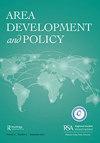Connectivity and competition: the emerging geographies of Africa’s ‘Ports Race’
IF 1.8
Q3 DEVELOPMENT STUDIES
引用次数: 0
Abstract
ABSTRACT This paper critically analyses Africa’s ‘Ports Race’, the massive increase in port infrastructure investment taking place across the continent since the mid-2000s. It argues that the phenomenon shapes, and is shaped by, three interconnected trends: (1) an emerging material–political–institutional lock-in to a new extractivist paradigm of capital accumulation; (2) continental governments’ growing embrace of state-led development strategies; and (3) the repackaging of globalized discourses of connectivity and idealized visions of modernity by elites to legitimize both their own political positions and what are often exploitative and environmentally destructive practices/processes. Taken together, these developments point to novel configurations of engagement playing out across the continent between transnational capital and political elites.连通性与竞争:非洲“港口竞赛”的新兴地域
本文批判性地分析了非洲的“港口竞赛”,即自2000年代中期以来整个非洲大陆港口基础设施投资的大幅增加。本文认为,这一现象形成了三种相互关联的趋势,并被它们所塑造:(1)一种新兴的物质-政治-制度锁定在一种新的资本积累的榨取主义范式中;(2)大陆各国政府越来越接受国家主导的发展战略;(3)精英们重新包装全球化的连通性话语和理想化的现代性愿景,以使他们自己的政治立场和通常是剥削性和环境破坏性的做法/过程合法化。综上所述,这些发展表明,跨国资本和政治精英之间的接触在整个非洲大陆呈现出新的格局。
本文章由计算机程序翻译,如有差异,请以英文原文为准。
求助全文
约1分钟内获得全文
求助全文

 求助内容:
求助内容: 应助结果提醒方式:
应助结果提醒方式:


